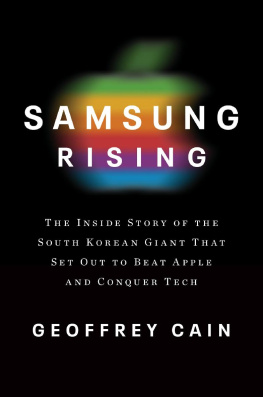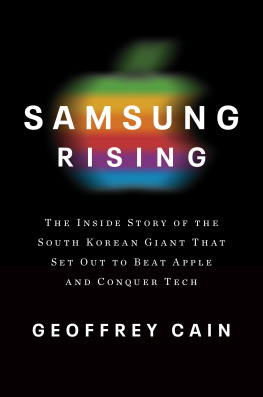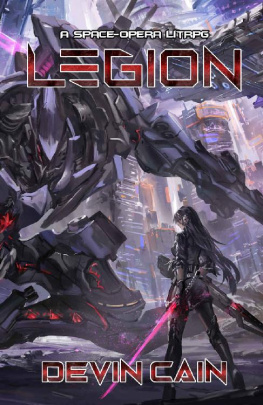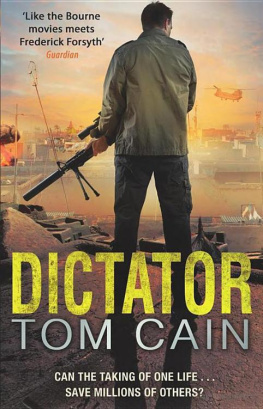Geoffrey Cain - The Perfect Police State
Here you can read online Geoffrey Cain - The Perfect Police State full text of the book (entire story) in english for free. Download pdf and epub, get meaning, cover and reviews about this ebook. year: 2021, publisher: PublicAffairs, genre: Politics. Description of the work, (preface) as well as reviews are available. Best literature library LitArk.com created for fans of good reading and offers a wide selection of genres:
Romance novel
Science fiction
Adventure
Detective
Science
History
Home and family
Prose
Art
Politics
Computer
Non-fiction
Religion
Business
Children
Humor
Choose a favorite category and find really read worthwhile books. Enjoy immersion in the world of imagination, feel the emotions of the characters or learn something new for yourself, make an fascinating discovery.

- Book:The Perfect Police State
- Author:
- Publisher:PublicAffairs
- Genre:
- Year:2021
- Rating:4 / 5
- Favourites:Add to favourites
- Your mark:
- 80
- 1
- 2
- 3
- 4
- 5
The Perfect Police State: summary, description and annotation
We offer to read an annotation, description, summary or preface (depends on what the author of the book "The Perfect Police State" wrote himself). If you haven't found the necessary information about the book — write in the comments, we will try to find it.
The Perfect Police State — read online for free the complete book (whole text) full work
Below is the text of the book, divided by pages. System saving the place of the last page read, allows you to conveniently read the book "The Perfect Police State" online for free, without having to search again every time where you left off. Put a bookmark, and you can go to the page where you finished reading at any time.
Font size:
Interval:
Bookmark:
A scarifying dive into Chinas pernicious spy state. A prescient, alarming work on the overreach of technology and state power.
Kirkus (starred review)
The Perfect Police State should come with a warning: the scope of the Chinese surveillance state is deeper, broader, more insidious and terrifying than you can imagine. Geoffrey Cain deftly details how China has used global businesses, global aid, unabashed censorship at home, and alliances with authoritarian regimes to create an ever-expanding police state. Cain doesnt lose sight of the people entrapped by the system, most memorably a woman named Maysem whose trials keep the focus on the real human cost. The Perfect Police State is a tour-de-force.
Elizabeth Becker, author of When the War Was Over
In an expos that is as timely as it is distressing, Geoffrey Cain shows how China is using artificial intelligence and totalitarian repression to turn its westernmost region into a human-rights hellhole. After reading The Perfect Police State , it is impossible to regard the Chinese leadership with anything other than contemptand fear.
Blaine Harden, author of Escape from Camp 14
The future has arrived and it is beyond anything George Orwell could have imagined. In this important new book, Cain details exactly how the Chinese Communist Party deployed twenty-first-century technologyfacial recognition, DNA tracking, artificial intelligenceto trap millions of its own citizens in a terrifying dystopia.
Barbara Demick, author of Nothing to Envy: Ordinary Lives in North Korea
F OR M OM, WHO TAUGHT ME TO CARE ABOUT THE STATE OF THE WORLD
From August 2017 to September 2020, I interviewed 168 Uyghur refugees, technology workers, government officials, researchers, academics, activists, and a former Chinese spy who was preparing to defect. Most requested that I use pseudonyms if I published their interviews.
This was the only way I could write an accurate book on the Uyghurs, Kazakhs, and other ethnic groups that are oppressed in western China. Their families, who are still in China, can easily be harassed or tortured by the police or intelligence services. Some interviewees, public figures whose stories have already been widely published, requested that I use their real names.
The protagonists name in this book, Maysem, is a pseudonym for a young Uyghur woman I met in Ankara, the capital of Turkey, in October 2018. I interviewed her fourteen times from October 2018 to February 2021.
As I researched this book, I questioned myself about the wisdom of interviewing refugees who, under the cover of fake names, could take license to stretch their stories, or change their accounts to cope with unbearable trauma.
In fact, there is a long tradition among journalists and scholars of relying on refugee testimony when documenting political upheavals and human rights atrocities, sometimes withholding their names and identifying information. Researchers and writers have long relied on the testimony of White Russian, Jewish, Cuban, Chinese, and North Korean refugees.
Like some of these other writers, I spent my career as a foreign correspondent interviewing refugees and people in sensitive situations, whose careers or lives were at risk. I knew how to get around the downsides.
I rigorously cross-checked the statements of key characters with people who knew them and had heard their stories before. I also cross-checked my interviewees statements with other refugee accounts, media reports, the chronology of events on the public record, the Uyghur victim database at shahit.biz, the speeches in state media of Chinese leaders, human rights reports from Human Rights Watch, the Uyghur Human Rights Project, the US Congress and US State Department, and the work of a small group of researchers who analyze satellite imagery, computer data, and Chinese corporate reports.
For key interviews, I spoke with each person in anywhere from four to twenty-five sessions, spending between eight and sixty hours with each one, revisiting the same questions, and listening carefully for inconsistencies or omissions. In 2 out of 168 interviews, I found the stories changed in minor ways. In one other interview, I found that the interviewee withheld information that reflected poorly on him; he was attempting to convince me he was a victim and not a perpetrator.
I didnt use these three interviews.
In all other interviews, the stories remained consistent down to fine details, in dates, places, addresses, and names. Most of these details were verifiable on Google Maps satellite imagery, in leaked Chinese state documents and online tender documents the interviewees provided to me, in annual reports published online by Chinese corporations, and in my own observations and travels inside Xinjiang.
From December 2020 to February 2021, I worked with a rigorous fact-checker, Wen-yee Lee, a Taiwanese technology journalist and native Mandarin Chinese speaker, to double-check the material in this book. She reviewed interview recordings and transcripts, called the interviewees and double-checked their stories, listened to their stories an additional time for changes or omissions, and rigorously checked the original Mandarin Chinese sources cited and translated in English-language press reports and research. I further checked passages on the mechanics of artificial intelligence, facial recognition, semiconductors, DNA collection, and other technical fields with academic experts. These experts, some well known in their fields, vouched for the technological validity of what Uyghurs witnessed and told me about Chinas surveillance state. I take responsibility for any remaining errors.
Since Chinas surveillance state is growing in sophistication, I withheld or obscured some pieces of identifying information, such as the exact chronology, locations, ages, and the amount of time that transpired between events. When writing the story of the protagonist Maysemthe pseudonym is also the name of a historical Uyghur heroineI removed identifying dates and places, and obscured the amount of time that passed between events during her imprisonment. This was the only way to protect my sources while remaining true to their stories. If Id revealed too much, the intelligence services would have no problem tracking down whom I spoke with, along with their families and friends.
Uyghur names consist of the individuals name first and the family name second. Han Chinese names follow the reverse standard of family name first, individuals name second. Out of respect for the people who appear in this book, Ive written their names in English as they prefer to write it themselves. Some prefer to write their Han Chinese names in English with the given name first and family name second (Kai-fu Lee), as opposed to the usual convention (Xi Jinping). When writing Han Chinese words and names in our alphabet, the pinyin system, the international standard for the romanization of Standard Chinese, is used throughout.
In the region of Xinjiang in western China, people call their dystopia the Situation.
Since 2017, an estimated 1.8 million Uyghurs, Kazakhs, and people from other primarily Muslim minorities have been accused by the government of harboring ideological viruses and terrorist thoughts, and taken away to hundreds of concentration camps. Many of the camps were repurposed high schools and other buildings, turned into detention centers for torture, brainwashing, and indoctrination. It is the largest internment of ethnic minorities since the Holocaust.
Even if you dont end up in a camp, daily life is hellish. If youre a woman, you might wake up every morning next to a stranger appointed by the government to replace your partner whom the police disappeared to a camp. Every morning before work, this minder will teach your family the state virtues of loyalty, ideological purity, and harmonious relations with the Communist Party. Hell check on your progress by asking you questions, ensuring you havent been infected with what the government calls the viruses of the mind and the three evils: terrorism, separatism, and extremism.
Font size:
Interval:
Bookmark:
Similar books «The Perfect Police State»
Look at similar books to The Perfect Police State. We have selected literature similar in name and meaning in the hope of providing readers with more options to find new, interesting, not yet read works.
Discussion, reviews of the book The Perfect Police State and just readers' own opinions. Leave your comments, write what you think about the work, its meaning or the main characters. Specify what exactly you liked and what you didn't like, and why you think so.












